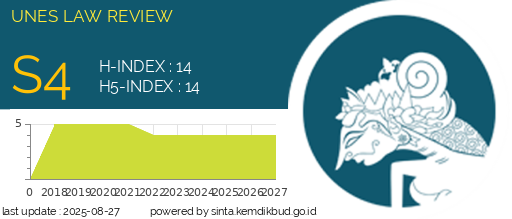Constitutional Review of Covid-19 Law at Indonesia Constitutional Court
DOI:
https://doi.org/10.31933/unesrev.v6i1.1065Keywords:
Constitutional Court, Covid-19, Constitutional, ReviewAbstract
This paper analyzes the constitutionality of Law Number 2 of 2020 concerning COVID-19 which was originally passed as emergency legislation in the form of “government regulation in lieu of law”. The COVID-19 Law reaps pros and cons because it is considered to have the potential to give birth to abuse of power in times of crisis. Grounded by final decision of The Constitutional Court, this paper raises three main issues; First, the vital role of judicial power in providing checks and balances in an emergency situation. Second, the prohibition of granting immunity to the practice of irregularities in state finances in times of crisis. Third, the need for a time limit for granting discretion caused by COVID-19 to ensure legal certainty. Through the method used, namely normative juridical, conclusions were obtained regarding the urgency of the role of the power of the Constitutional Court in Indonesia as the protector of the Constitution in the COVID-19 emergency.
Downloads
References
Ayuni, Q., Arinanto, S., Arsil, F., & Indrati, M. F. (2022). Concept and Implementation on the State of Emergency in Indonesia: Outlook to Strengthen Checks and Balances during Crisis. Revista de Investigações Constitucionais, 9, 11-36.
Arsil, Fitra, Qurrata Ayuni, and Ariesy Tri Mauleny. "The disappearance of the ‘legislative model': Indonesian parliament's experience in response to Covid-19." The Journal of Legislative Studies (2022): 1-23.
Arsil, Fitra, and Qurrata Ayuni. "Model Pengaturan Kedaruratan Dan Pilihan Kedaruratan Indonesia Dalam Menghadapi Pandemi Covid-19." Jurnal Hukum & Pembangunan 50.2 (2020): 423-446.
Bisariyadi, Bisariyadi. "Membedah Doktrin Kerugian Konstitusional." Jurnal Konstitusi 14.1 (2017): 22-44.
Budianto, A. (2020). Legal Research Methodology Reposition in Research on Social Science. International Journal of Criminology and Sociology, 9, 1339–1346.
Bulmer, E. (2018). Emergency powers. In International IDEA Strömsborg (Vol. 18, Issue 8695). International Institute for Democracy and Electoral Assistance International. https://doi.org/10.1177/0032258x4001300104
Christiani, T. A. (2016). Normative and Empirical Research Methods: Their Usefulness and Relevance in the Study of Law as an Object. Procedia-Social and Behavioral Sciences, 219, 201–207.
Denysov, V., & Falalieieva, L. (2020). Derogation In The Field Of Human Rights: International Legal Instruments And Practice Of Ukraine. International \& Comparative Law Review/Mezinárodn{\’\i} a Srovnávac{\’\i} Právn{\’\i} Revue, 20(2).
Ferejohn, J., & Pasquino, P. (2004). The law of the exception: A typology of emergency powers. International Journal of Constitutional Law, 2(2), 210–239.
Fitzpatrick, J. (1994). Protection against Abuse of the Concept of Emergency. Stud. Transnat’l Legal Pol’y, 26, 203.
Ginsburg, T., & Versteeg, M. (2020). Binding the Unbound Executive: Checks and Balances in Times of Pandemic. Available at SSRN.
Greene, A. (2018). Permanent states of emergency and the rule of law: constitutions in an age of crisis. Bloomsbury Publishing.
Gross, O., & Aoláin, F. N. (2006). Law in times of crisis: emergency powers in theory and practice (Vol. 46). Cambridge University Press.
Grossman, C. (1986). A Framework for the Examination of States of Emergency Under the American Convention on Human Rights. Am. UJ Int’l L. \& Pol’y, 1, 35.
Isra, S. (2016). Peran Mahkamah Konstitusi dalam penguatan hak asasi manusia di Indonesia. Jurnal Konstitusi, 11(3), 409–427.
Lillich, R. B. (1985). The Paris minimum standards of human rights norms in a state of emergency. American Journal of International Law, 79(4), 1072–1081.
Macdonald, R. S. J. (1998). Derogations under Article 15 of the European Convention on Human Rights. Colum. J. Transnat’l L., 36, 225.
Munir, S. (2021). Asas Keterbukaan dalam Pelaksanaan Fungsi Legislasi Dewan Perwakilan Rakyat (Perspektif Islam dan Hukum Positif di Indonesia). YUDISIA: Jurnal Pemikiran Hukum Dan Hukum Islam, 12(2), 257–274.
Oraá, J. (1992). Human Rights in States of Emergency in International Law. Oxford.; Clarendon Press.
Posner, E. A., & Vermeule, A. (2011). The executive unbound: after the madisonian republic. Oxford University Press.
Rossiter, C. L. (2011). Constitutional Dictatorship - Crisis Government in the Modern Democracies. Read Books Limited. https://books.google.co.id/books?id=qSp8CgAAQBAJ
Schmitt, C. (2006). Political Theology: Four Chapters on the Concept of Sovereignty (G. Schwab (ed.)). University of Chicago Press.
Tsagourias, N. (2010). Necessity and the use of force: A special regime. Netherlands Yearbook of International Law, 41, 11–44.
Tupper, A. (1994). Human Rights in States of Emergency in International Law by Jaime Ora. In Alberta Law Review. Clarendon Press. https://doi.org/10.29173/alr1188
Downloads
Published
How to Cite
Issue
Section
License
Hak cipta :
Penulis yang mempublikasikan manuskripnya di jurnal ini menyetujui ketentuan berikut:
- Hak cipta pada setiap artikel adalah milik penulis.
- Penulis mengakui bahwa UNES Law Review berhak menjadi yang pertama menerbitkan dengan lisensi Creative Commons Attribution 4.0 International (Attribution 4.0 International CC BY 4.0) .
- Penulis dapat mengirimkan artikel secara terpisah, mengatur distribusi non-eksklusif manuskrip yang telah diterbitkan dalam jurnal ini ke versi lain (misalnya, dikirim ke repositori institusi penulis, publikasi ke dalam buku, dll.), dengan mengakui bahwa manuskrip telah diterbitkan pertama kali di Jurnal UNES Law Review.



















